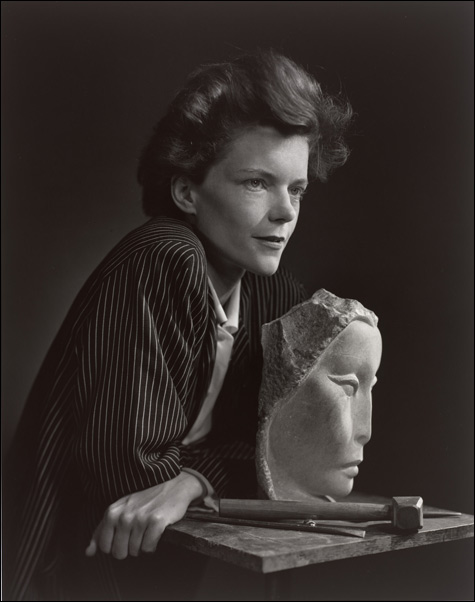
FACE TO FACE Karsh's portrait of sculptor Sally Ryan. |
Yousuf Karsh is one of the giants of portrait photography. His iconic shots of Winston Churchill, George Bernard Shaw, and Ernest Hemingway are the definitive portraits of the craggy grand old men. And his photos of a willowy Audrey Hepburn and a smoldering Anita Ekberg ain't nothing to sneeze at. But "Yousuf Karsh: Portraits of Artists" at the RISD Museum (224 Benefit Street, through August 23) is the photographer at his weakest.There are a handful of striking shots here. Georgia O'Keeffe is a flinty, witchy, black-clad ol' pioneer gal seated gazing toward her rough wooden door and a slice of New Mexico desert. A deer skull hangs on the wall behind her, and her hand touches a weathered tree stump. Another photo shows a white-bearded Edward Steichen rowing with a woman by a hill of birches. Karsh pays careful attention to light — leaving nearly everything shadowed, except for the people in the boat, the crests of the waves, and a fleecy tree.
But most of the 27 photos here, a gift to the museum from Karsh's widow Estrellita, feel gimmicky. Karsh often seems not to know what to do with artists and succumbs to trying to be arty.
Karsh was born in Armenia in 1908, apprenticed in Boston, set up shop in Canada, photographed for major magazines, and returned to Boston for the final five years before his death in 2002. Greatest hits cluster in the '40s and '50s, when his shots epitomized the grandeur and glamour of World War II, the golden age of Hollywood, and the heyday of the big picture magazine Life. He's a master at conjuring drama from posing and lighting his subjects just so.
But when it came to artists, Karsh fell into clichés. His favorite move is to pose sculptors right behind or between their (preferably figurative) sculptures so that their art rhymes with their faces. He uses this move for Picasso in 1954 and Alberto Giacometti, Man Ray, and Max Ernst in 1965. Karsh's 1979 portrait of Andy Warhol, in which the artist holds a paintbrush to his cheek, is one of the worst things he ever shot. The pose is so dreadfully cheesy that it has to be a (failed) joke. Right?
Goofball machines — jury-rigged from plastic bags, small fans, electronics, and cut-up plastic bottles — dangle from the ceiling in a dark RISD gallery in Brooklyn artist Shih Chieh Huang's catchy, cute exhibit "Connected: Eject before disconnecting" (through October 18). Lights blink blue, green, and red while fans click on and off, spinning the spacecraft-like contraptions or inflating plastic bag appendages. The most complex piece resembles a sea anemone crossed with a chandelier crossed with a flying saucer. The disk slowly spins on a cable while fans inflate plastic bags along its edge with a crinkling, breathing noise. Long feelers inflate up and down. Electronic chirps, like the voices of Star Wars droids, fill the room. The whole scene resembles constellations flickering in the night sky, an alien dance, or robots cavorting at the bottom of the sea.
For "Pulled Up" (through August 23), RISD curator Judith Tannenbaum invited Carl Ostendarp to put together a show of his own works plus art rummaged from RISD's collection. Ostendarp, who was born in Amherst, Massachusetts and now resides in Ithaca, New York, paints the walls pink at top and red-orange at the bottom so the pink seems to drip down over the red-orange. On top, he hangs a couple of his own paintings and a selection of minor works by Joseph Albers, Roy Lichtenstein, Joan Miro, Andy Warhol, et al. The effect is most interesting with Ostendarp's own acrylic painting Aaarrgh, featuring the deadpan title painted in red-orange across a pink background. The colors match the wall, confusing what's what. An Adolph Gottlieb painting with a similar color scheme also plays this game. Graphic works, like Nicholas Krushenick's 1965 sunburst poster for the Minneapolis Institute of Arts, chime with Ostendarp's graphic style.
But too many of his choices feel random, shoehorned into the project. Which shows how tricky it can be to pull together a sharp exhibition, how easy it is to take for granted the talent of RISD curators, and ultimately that Ostendarp's skill isn't as a curator.
Correction: In my review last week, I mistakenly attributed artwork to Shay Platz Bonnie that was by Rich DiSimone.